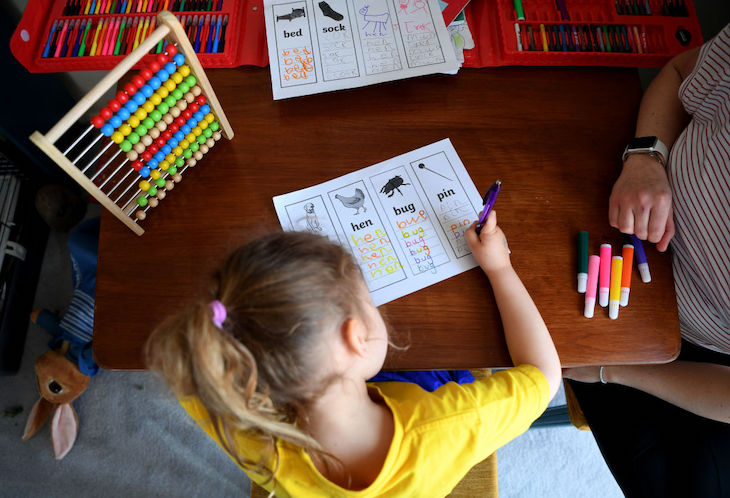I am 11 years old and in an English class. My teacher asks who wants to read out a passage from Iqbal by Francesco D’Adamo. No one volunteers. She scans the classroom and her gaze lands on me. Wrong kid, miss: I can’t read from left to right. For me, words refuse to stay still; sentences wiggle and oscillate in size, letters disappear, or crop up where they shouldn’t. I like reading from the middle of the page, gulping down whole paragraphs. Focusing on individual words feels counterintuitive and takes time.
Two years later, and to no one’s surprise, I am diagnosed as dyslexic. At the time, the diagnosis gave comfort: it was a satisfying explanation for a frustrating situation. But now, a decade on, I feel I’ve grown out of it.
Can you really grow out of dyslexia? An estimated 870,000 children in the UK have dyslexia, but their purported symptoms are so diverse can they really be said to share the same condition? Comparing one person’s dyslexia to another’s is certainly difficult.
Growing up, the things that other kids could accomplish in the classroom with ease confounded me. A bizarre reading style was the least of my concerns. I was inarticulate to the point of being tongue-tied. Until I was ten, the only way I could talk clearly was to plan exactly what I wanted to say before I said it (maybe not the worst habit to acquire). I had a laissez-faire approach to spelling. I avoided writing like the plague. The physical act of putting pen to paper felt almost painful.
My relaxed parents assumed that my issues would resolve themselves in time. Dad also started out as a slow learner, but he caught up in his teens and became the first person in his family to go to university.
With the benefit of hindsight, he probably did suffer from learning difficulties: we share many of the same symptoms. But growing up in a working-class neighbourhood in 1980s Sicily meant terms like ‘SEN’ (special educational needs) and ‘neurodivergent’ weren’t exactly common parlance. But he managed to compensate and do well in life.
Another girl from my year was screened for learning problems at the same time as me. Our results indicated something was awry, but then came the kicker: formal diagnostic assessments could only be carried out privately, and they are prohibitively expensive. Still, our school recommended we get tested. My parents got the money together, my friend’s did not.
A decade on from my diagnosis, I feel I’ve grown out of it
This struck my teenage self as incredibly unfair, until I found out we would receive identical provisions: 25 per cent extra time in exams and voluntary weekly sessions with a special needs teacher. When I relayed this information to my dad he said: ‘Great, we’ve spaffed £700 on a medical label.’
But, like my dad, my friend and I muddled through. We both did well in our GCSEs and A levels. Did my school pal have dyslexia? Perhaps. Would we have benefitted from better resources and state funding? Probably. But our different experiences show that getting a label or diagnosis isn’t necessarily vital. The messy truth is that the brain is a malleable organ capable of compensating and adapting, it can overcome all manner of challenges.
It’s difficult to pinpoint when I got over dyslexia, but over time my symptoms disappeared. When possible, I’d force myself to practise reading out loud. Joy of joys, after a while my efforts started to bear fruit: the words on the page stopped moving.
I sidestepped my spelling and handwriting problems thanks to technology. The march of progress means handwriting is declining: cursive writing is out of fashion. With my dexterous Gen Z fingers, I took to typing like a fish in water. Still, I only started using a laptop in sixth form. Before then, I kept dictionaries and thesauruses handy. Rocking up to school with those made me feel like a student from the 50s, but it was worth it.
By the time I started university, I’d nailed the art of studying and writing essays. When it came to filling out course admin, I didn’t declare myself dyslexic: doing so would’ve felt dishonest and misrepresentative. The label no longer seemed to accurately describe the reality of my situation. Is dyslexia a lifelong condition? Hand me a copy of Iqbal, and I’ll make you doubt that it is.























